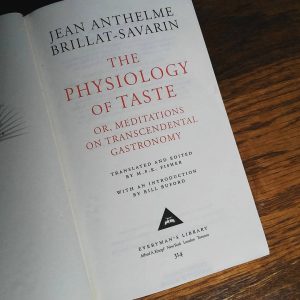 Often cited as the most influential food book ever published in the western world, The Physiology of Taste was written by Jean Anthelme Brillat-Savarin. Born in 1755 in Belley, France, “B-S”[1] grew up to become first a lawyer and then a judge in provincial France during, well, a fairly tumultuous time in European history. The details of his life are fascinating. My copy of TPT includes a brief biography containing lines like “crossed swords with Robespierre” and “incurred the displeasure of Napoleon”. While he did live in exile in America for a short while, B-S managed to keep his head and most of his property throughout the Revolution and the Napoleonic years. It was in the last years of his life that he wrote his most lasting work, The Physiology of Taste.
Often cited as the most influential food book ever published in the western world, The Physiology of Taste was written by Jean Anthelme Brillat-Savarin. Born in 1755 in Belley, France, “B-S”[1] grew up to become first a lawyer and then a judge in provincial France during, well, a fairly tumultuous time in European history. The details of his life are fascinating. My copy of TPT includes a brief biography containing lines like “crossed swords with Robespierre” and “incurred the displeasure of Napoleon”. While he did live in exile in America for a short while, B-S managed to keep his head and most of his property throughout the Revolution and the Napoleonic years. It was in the last years of his life that he wrote his most lasting work, The Physiology of Taste.
Even if you’ve never heard of B-S or this book, you’ve almost certainly heard some of the lines contained within. Some have become proverbs. He wrote, for instance, “You are what you eat.” (Okay, he wasn’t quite that succinct. His aphorism is usually translated, “Tell me what you eat, and I shall tell you what you are.”) He also recognized that, “The destiny of nations depends on how they feed themselves.” This line is often quoted by modern real-food crusaders like Michael Pollan.
One particularly hilarious quote: “A dinner which ends without cheese is like a beautiful woman with only one eye.”
Several of his one-liners are peppered throughout the work of nerdy food educators like Alton Brown (and me):
“We can learn to be cooks, but we must be born knowing how to roast.”
“Turkey is truly the finest gift that the New World gave to the Old.”
These quotes hopefully illustrate that despite its intimidating, scientific-treatise-sounding title, The Physiology of Taste contains all manner of quips, jokes, anecdotes, and practical advice. It is a glimpse into classical French cuisine in all its decadence, including truffled turkey and Sauternes and foie gras, as well as a compendium of sound information on classic techniques like deep-frying. It is a rich and deeply gratifying read, but I think what is most important, and what makes it so timeless, is Brillat-Savarin’s Doctrine of Gastronomy, which is very simple, but profound.
Allow me to paraphrase.
God wants us to eat. To facilitate this process, He first stimulates us with Appetite, and then rewards us with Pleasure. In eating and sating your hunger you are doing what you have been designed to do. The point here is the connection between food and pleasure, and the idea that you needn’t feel shame in that pleasure, because the pleasure is an intrinsic part of the equation.
Immediately after hearing this many folks react with disgust and incredulity: “If all we did was sate our appetites we’d eat fat and sugar and alcohol all day and we’d all die early deaths!”
The second tenant of gastronomy is that all things must be taken in Moderation. Though promoting the pleasures of the table, Brillat-Savarin abhorred gluttony and drunkenness. His ability to frankly enjoy and even revel in gastronomic pleasure while exercising restraint is the very essence of elegance and civility.
So yes: a hugely influential book. There is in fact an entire group of writers and eaters that I consider direct intellectual descendants of Brillat-Savarin. I’d like to discuss them each in turn, but the two main ones are MFK Fisher (who actually translated my edition of The Physiology of Taste from French to English…) and Jeffrey Steingarten, probably my favourite living food writer.
I have never met another human being in the flesh who has read B-S or MFK Fisher. I know they exist but I’ve never met them or at least never talked to them about it. By which I mean this is an über-nerdy and esoteric topic that I don’t expect many to take an interest in. Stay tuned for more!
#ButtonSoupLibrary might or might not become a series of posts about my favourite books on food, including but not limited to conventional cookbooks.
- Unfortunate initials, I know.